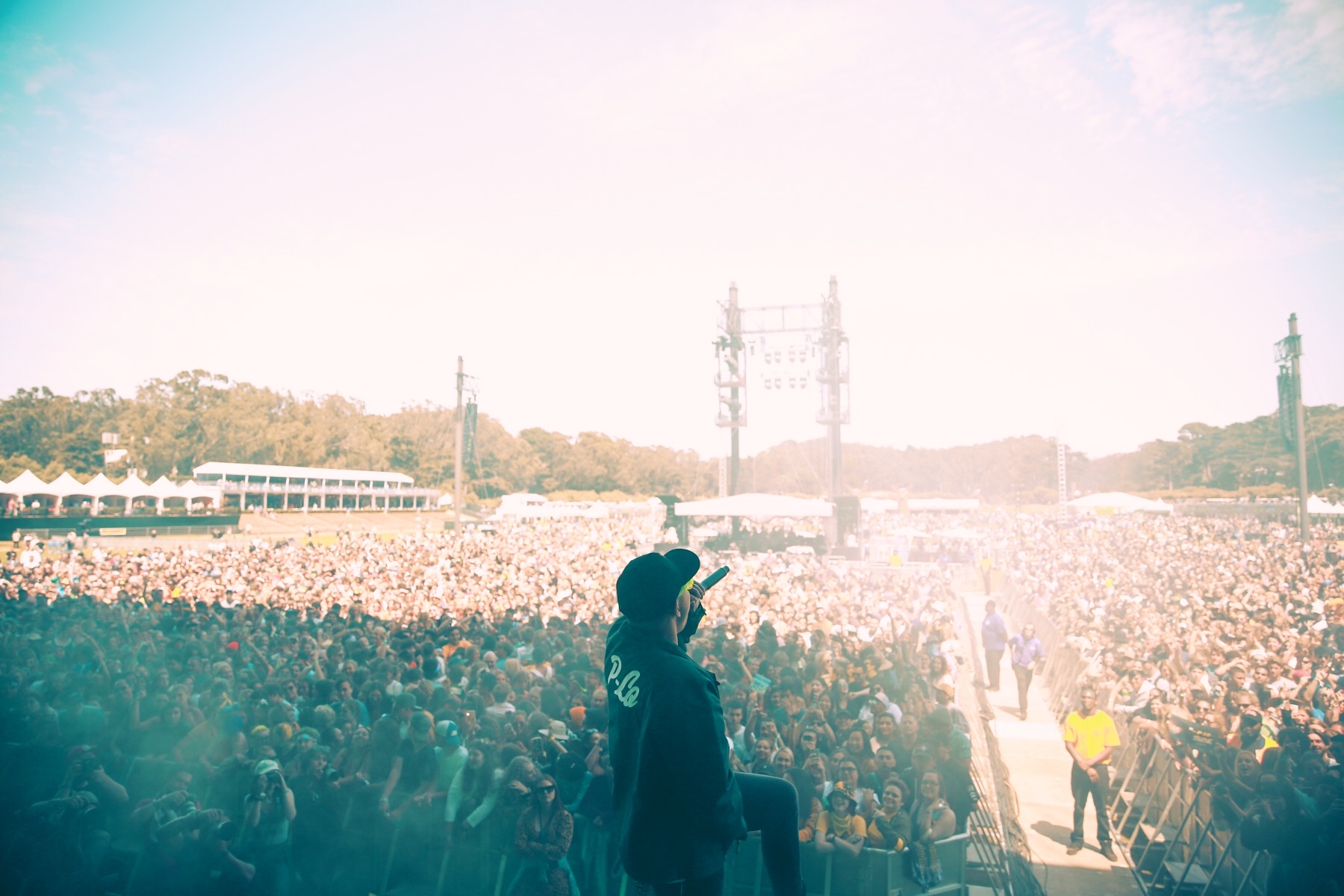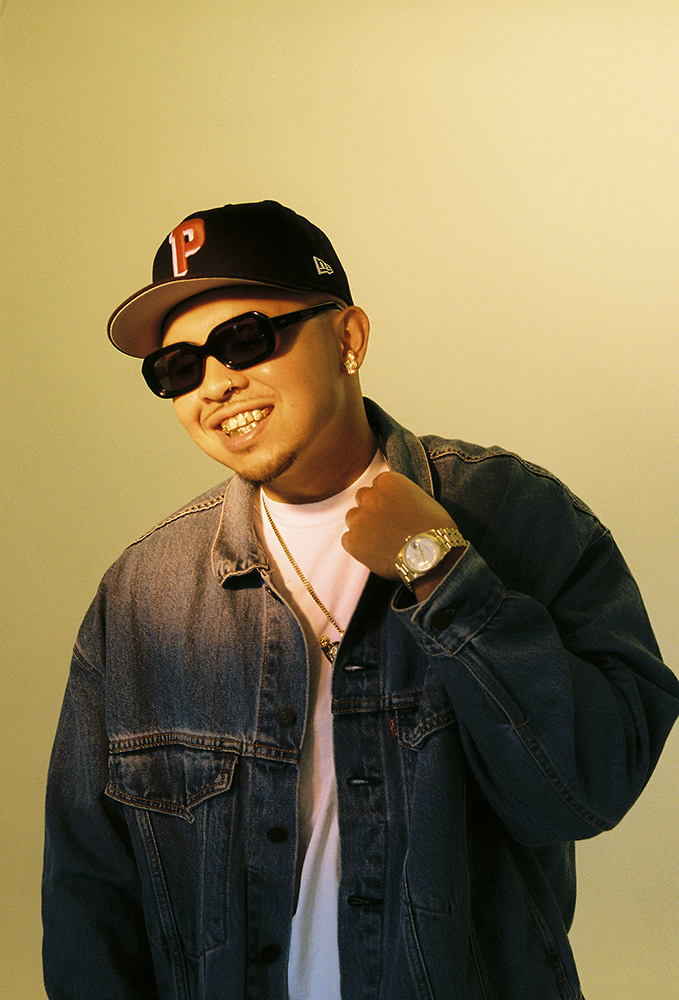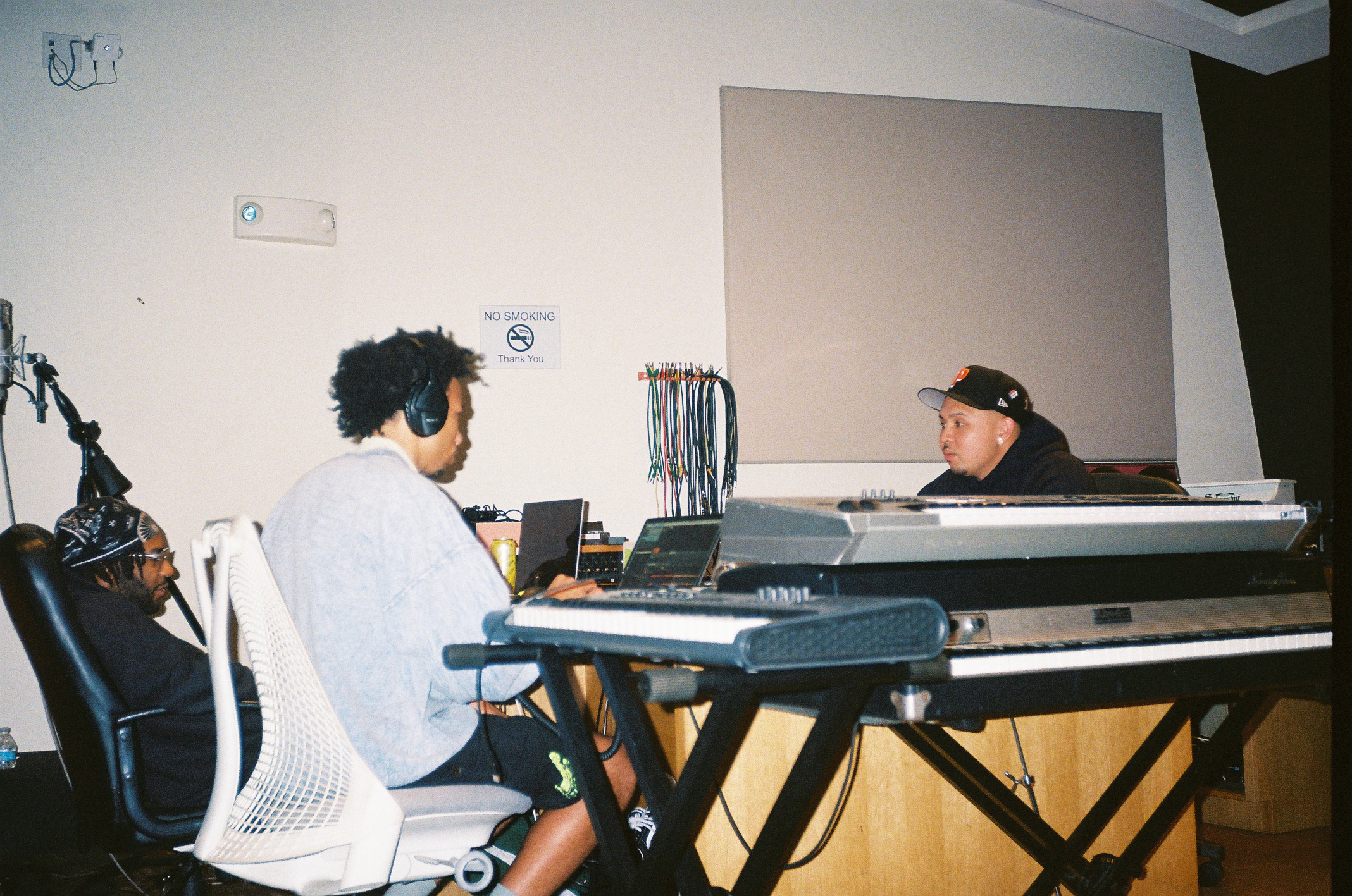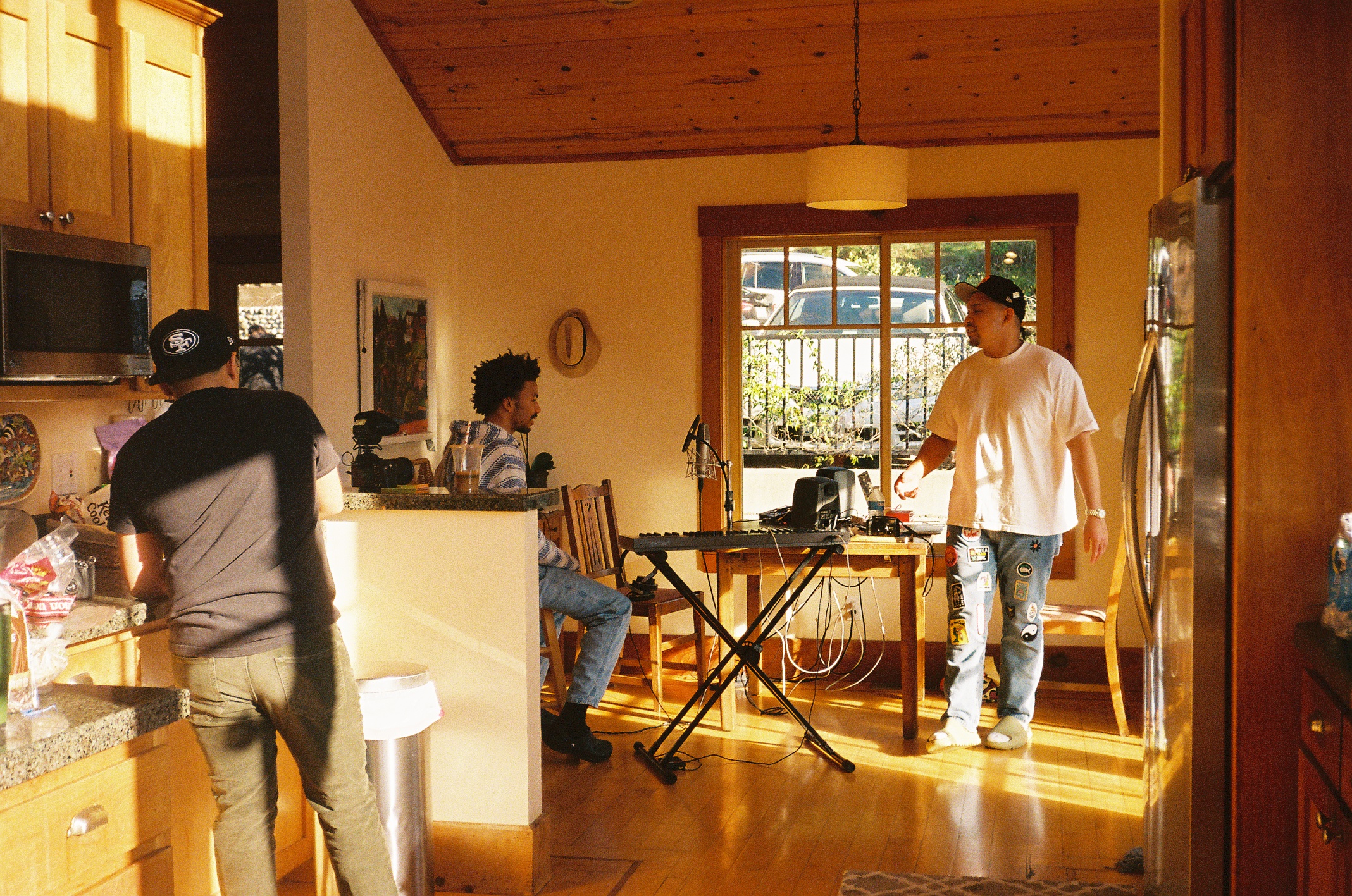
EUGENE KAN: I know that you were inspired to get into music production because of your older brother. What was it like having somebody guide you through that world? In the days when MTV had no Asian representation, what did it mean to have a strong role model in your brother?
P-LO: My older brother was my f***ing hero. He was the person that I really looked up to and he was doing it, and I was like, “Oh wait… he’s like doing it!” His generation was the one that broke down the door for me to even have the opportunity to do it. My dad didn’t create music, but he always had a love for music. And I think that’s probably where it started for both of us. My dad had a big-ass sound system in the living room and he’d just be playing all different types of music. In the Bay we have such a love for music. We’re exposed to all different types of music growing up. The environment we grew up in forced us to be into something, you know what I’m saying? Also, I think my brother was, and still is, a selfless, fearless guy. He’s always the one to bite the bullet for everyone, and he’s always been that for me and continues to be that for me.
Were your parents supportive of your journey?
Of course not! I was in the middle of college when I decided to do music full time. I was playing basketball in college. I had to figure out whether I was going to transfer schools or pursue music, right after the basketball season ended. I was getting all my transfer stuff ready and I was like, “You know what? I think I just want to make music. I’m just gonna figure it out.” And obviously, that was something that was pretty frowned upon by my parents, especially since my older brother and sister both graduated college. I was the one that didn’t finish school.
They weren’t happy about it because they would see me have my friends come over and we’re just making music and kicking it. My dad would be like, “Hey, what are you guys doing? Is this a hobby for you?” Once things started really picking up, my mom would go to work and her coworkers would be like, “Your son’s doing so well! I heard him on the radio last night.” My dad’s younger interns would say, “Oh, we just went to your son’s show.” Once they got that outside validation, they were like, “I think he’s alright… I think he’s alright.”
Imagine you go across the ocean and figure your whole s*** out. And then your son is like, “I just want to be a rapper.” You’d be like, “Hey, you motherf***er, I did not do all this s*** for you just to become a rapper.” It’s actually a little funny. As much as they were scared for me, they came here exactly to give me these opportunities.
“ My parents made sacrifices for me to be able to do this. I can’t be coming out here and not going 110%. ”
What was the transition for you from production to rapping like?
Even when I was doing production, I had my own mixtapes. Then I was guest featured on some stuff by IamSu!* so that was a start. Personally, I really wanted to create something intentional, so that’s where the separation between being a producer and an artist came. It was around 2015, 2016, when I had enough production under my belt and I could use that money to fund my own stuff. I took all that money to jumpstart what P-Lo is now.
It was a huge gamble for me because at that time there was so much production work coming in. There was some stuff I really had to bite the bullet on because they were money opportunities for me, but I truly believed in what I wanted to do and wanted to pursue with P-LO. I thought, “If I don’t take this risk right now, I’m gonna be boxed into production and I never want to be boxed into anything.” That’s something I still take with me to this day, I never wanna be boxed into one thing.
From what I gather, there’s a strong and tight-knit community in the Bay. Some of your early work with the Bay-area crew The HBK Gang certainly seemed to represent that.
I always like to say that in the Bay we’re living in the future with all the different ideologies and backgrounds. With HBK, there were so many people that came together and created something that was unique, multicultural, and progressive. Where else would there be a Filipino rapper? If any place is going to do something with people of all different types of backgrounds, the Bay will be the first. The HBK collective was an inside look at the Bay Area as a whole. To have been a part of it is still an honor to me. Some people have come up to me and said, “Yo, I’ve been listening to you since I was in middle school,” and now they’re fully outta college. It’s cool to be able to show people that it can be done and you can really follow your dreams.


Do you think this whole community and experience is specific to music?
Music’s a gateway for people in the world. People come together for music no matter where you’re at, you feel me? In the Bay, you see groups of friends just making music and that was the dopest part. We just happened to all be making music and because there were so many different backgrounds and different cultures, people had to really be aware of each other’s backgrounds. All my friends have come over to my house and ate everything my mom cooked. And when they’re out, they’re well- versed in ordering Filipino food. It’s dope to be able to share my culture with my friends and it goes both ways.
How did all this upbringing impact your sound?
There’s a rich music scene in the Bay and a lot of it stemmed from funk music. I still go back to those roots to this day. But I’ve always had to figure out ways to stand out as a Filipino rapper. I want to put my spin on things, but also pay homage to the ones that came before me. I didn’t just get here — people before me took the lumps and bruises for me to get to this position.
As a Filipino Asian American, you have all these different lenses. The Filipino lens, the Asian lens, and the American lens. How does this influence your work?
Having those things helps me understand people. Growing up where I grew up meant understanding nuances. Most importantly, having my friends coming from so many different cultures and different backgrounds. I love these people with all my heart and when you love someone you wanna be able to empathize with whatever they go through and what they came from. You wanna have that understanding of their culture and who they are. It definitely changes how you make music and how you express yourself, like knowing different bounces and rhythms or different ways people dance. Growing up in the Bay, part of it is even observing how people react to certain beats. It’s seeing how everyone could get down to a beat and understanding what can get people up instantly.
It’s interesting you played basketball at a good level in JuCo (Junior College) and went on to succeed in music, because I see a similarity in music and sports where if you can “perform,” then it doesn’t really matter what you look like.
It’s truly liberating. As humans, our number one thing is that we just want to express ourselves. We want to tell people how we feel, show people how we feel. Through music and basketball, I’ve always been able to do that.
I’ve been blessed to be able to do those things. Music and sports, those are two things that no matter where the hell you come from or what the hell you do, people will come together for that.
After being an artist for 7 to 8 years, what change has there been in the opportunities available to you?
AAPI month, that wasn’t a thing until recently. All the content being created during the month is dope, people getting recognized for who they are and what they do. They’re able to embrace who they are and not hide their culture. Growing up Asian American, we’ve had to just fall in line with things going on. My parents came here for an opportunity. They were gonna do what they needed to do to assimilate. That’s what my parents had to do for me to do what I’m doing now. I’m not here to assimilate. I’m here to take it on and I’m trying to inspire the next people to take it on.
“ My parents came here for an opportunity. They were gonna do what they needed to do to assimilate. I’m not here to assimilate. I’m here to take it on and I’m trying to inspire the next people to take it on. ”
How do you see yourself inspiring the next generation?
We’re supposed to inspire each other. I feel that’s what everyone’s supposed to do on this earth. Even if it’s like someone working in a store, seeing someone get up and do what they gotta do, that’s inspiring in itself. I know for me, being Asian American, my generation is just breaking ground. There are so many more people that have watched all the Asian American artists that are doing it right now and they’re going to do it better. And that’s truly the point of it. Everyone that’s doing it right now, we’re here to lay the groundwork for the next generation to inspire them and give them the roadmap.
What do you think could accelerate the AAPI movement?
It takes time for people to understand what’s happening and to know there’s a group of individuals doing something. My parents came here in the ’80s. So we’re really the first generation of people doing something different.
We did something with the San Jose Earthquakes recently and my nephew’s there too. And he’s just having a grand ol’ time, just turning it up without any worries. That’s what I’m doing and who I’m doing it for, so he can just be him and be able to express how he feels. And no matter what, he doesn’t have to conform or assimilate to anything. He just does him . That’s what our generation is supposed to do for the next generation.


What would you tell a younger version of yourself?
Just keep going. Just keep pushing. Understand that your path is not anyone else’s path. Understand that your journey is your own journey and never compare yourself to anyone else. Everyone has their own plan. Stay consistent and persistent.
What did you think it’d be like to be a rapper and what has been the reality?
There’s this stigma to the music industry that people always get f***ed over and it’s a crazy place. Yeah, there is that, but man, I love what I do so much. I really couldn’t see myself doing anything else. I really love what I do. I love the people that I’m around. I love being able to inspire people and, most importantly, pave the way for the next Asian Americans. That’s something I truly take pride in. For Asian Americans, for the Bay, just paving the way for f***ing everyone to express themselves in any form or fashion.
There’s this stereotype that Asians are quiet and don’t speak up. Where did your confidence come from?
It comes from hard work, whatever you’re doing, repeatedly doing it, and gaining confidence from the practice and the repetition. In sports, you need to have confidence from within first and then you gain a new level of confidence from practice, putting up all those jump shots, doing all the drills, and then when you perform you get another level of confidence. On top of that, I always think about it from my parents’ perspective. If I was 20 years old and I moved across the ocean, I wouldn’t even know what to f***ing do. And my parents did that for me to have this opportunity. That’s what gives me the fearlessness to keep going. ▲
*Iamsu! is a rapper, songwriter and producer. He was the lead member of The HBK Gang, a movement of Bay Area music artists and producers. The HBK Gang is considered to be a highly influential group that introduced hip-hop and the Bay Area sound to a larger audience globally.
